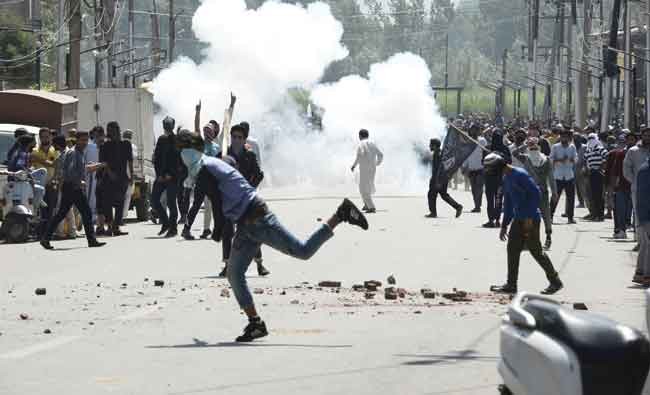NEW DELHI: The latest clash in the volatile city of Srinagar in which a security service vehicle ran over three people is a reminder that conflict will recur until the Indian government truly engages with Kashmiri youth, experts said on Saturday.
On Friday, scores of young men surrounded a vehicle belonging to paramilitary forces in downtown Srinagar, shouting slogans and pelting it with stones, according to reports in the Indian media. Three people were run over as the driver attempted to get away from the mob. One of the men later died of his injuries.
Kashmir has been at the heart of a dispute between nuclear-armed India and Pakistan, both of which claim it in its entirety.
It has been gripped by frequent bouts of violence for the past several months; more than 130 people have been killed in the state this year, and at least 120 local men have joined the militancy.
The latest incident took place at a time when the government of Prime Minister Narendra Modi had declared a cease-fire as a peace offering during the holy month of Ramadan.
Modi’s Bharatiya Janata Party rules the state in an alliance with Chief Minister Mehbooba Mufti’s PDP. Due to the rise in militancy and unrest, the alliance has lost all support in the state, experts say. The so-called cease-fire was a way for Mufti and her party to reclaim some lost territory.
The cease-fire faced fresh pressure after pictures of the vehicle nearly running over a man made it to social media.
Mirwaiz Umar Farooq, chairman of the All Parties Hurriyat Conference, an alliance of several organizations seeking Kashmiri separatism, said on Twitter: “Repression of Kashmiri’s continues...!”
Omar Abdullah, the state’s former chief minister, also condemned the incident. “Earlier they tied people to the fronts of jeeps & paraded them around villages to deter protesters, now they just drive their jeeps right over protesters. Is this your new SOP @MehboobaMufti sahiba? Cease-fire means no guns so use jeeps?” he tweeted.
Abdullah was referring to an incident last year when an army officer in Kashmir allegedly tied a civilian to the front of his vehicle and paraded him in some villages, leading to a massive outcry. 
“One thing is very clear — short-term measures, like the cease-fire during Ramadan, don’t work,” said Happymon Jacob, associate professor of disarmament studies at Jawaharlal Nehru University in Delhi. “Unless and until there’s a broader peace process, and a real outreach to the Kashmiris, there will not be any peace.”
Apart from suspending operations against militants during Ramadan, New Delhi also declared a cease-fire along the Line of Control, the defacto border with Pakistan. Last year it also appointed former intelligence bureau chief Dineshwar Sharma as its special representative to engage with the people of Jammu and Kashmir to find a peaceful solution to the problems in the state.
“That was bad news,” said JNU’s Jacob.
“You need a politically safe person to talk to Kashmiris. It just showed that there’s no political will in Delhi to send serious interlocutors to Kashmir and talk to them and empower them … And if you don’t deal with the larger issues, these issues will continue.”
The last time that India offered a cease-fire to militants was in 2000. At that time, too, the government in New Delhi was led by the BJP. That cease-fire soon went up in smoke due to militant attacks.



























